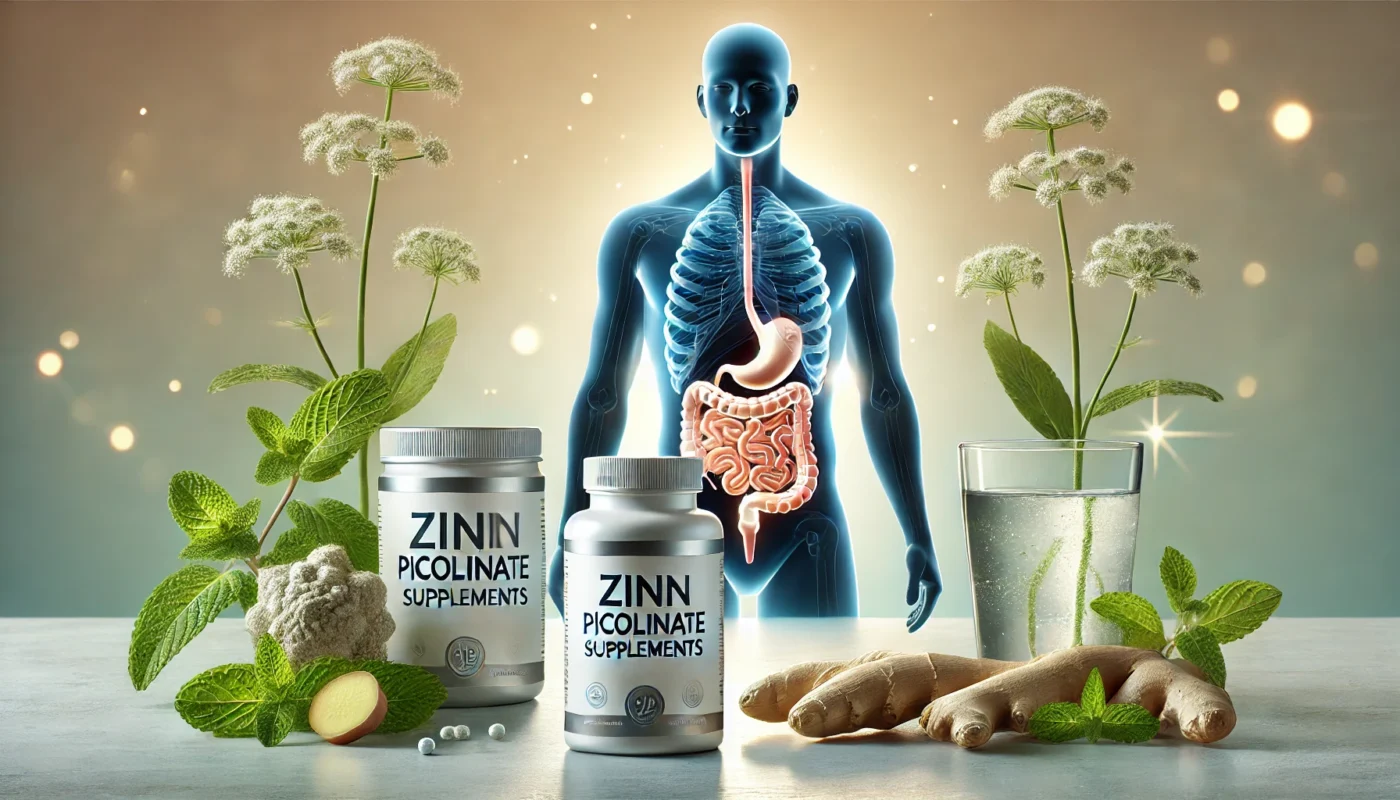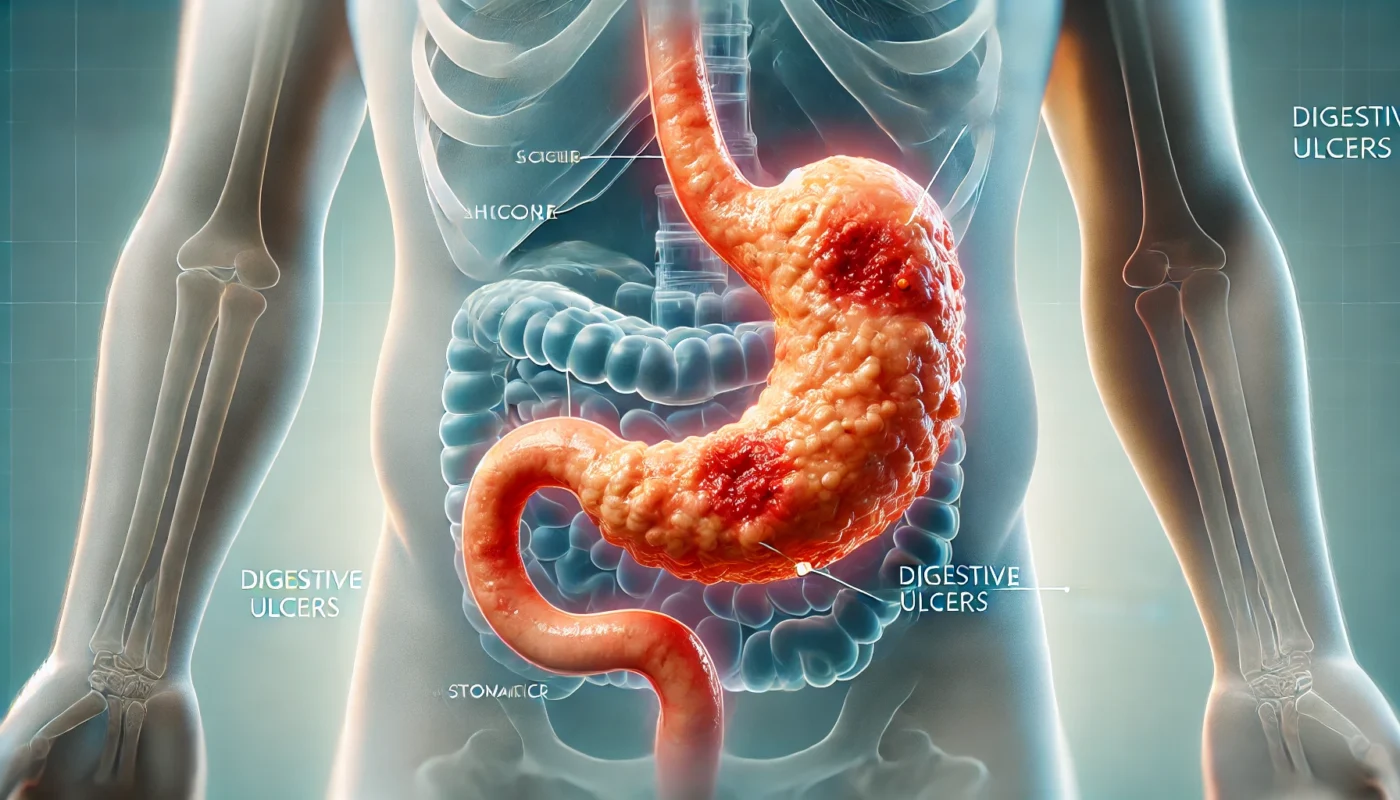Digestive ulcers, often referred to as peptic ulcers, are painful sores that develop in the lining of the stomach, esophagus, or upper small intestine. They are primarily caused by factors that compromise the protective mucosal layer, such as excessive stomach acid, chronic stress, the use of nonsteroidal anti-inflammatory drugs (NSAIDs), or infections like Helicobacter pylori. Left untreated, ulcers can lead to serious complications, including bleeding, perforation, and obstruction.
Zinc, a trace mineral essential for tissue repair, immune function, and inflammation control, plays a critical role in protecting the digestive tract. Zinc picolinate, a highly absorbable form of zinc, offers unique benefits for preventing and managing ulcers. By promoting mucosal healing, reducing inflammation, and enhancing cellular repair, zinc picolinate strengthens the gastrointestinal lining and protects against ulcer formation. This article delves into the science behind zinc picolinate’s role in ulcer prevention and management, supported by clinical studies and research findings.
You May Also Like:
Zinc Picolinate for Balancing Gastric Acid Levels: Here’s What to Know
Zinc Picolinate for Digestive Detox: Clearing the Path
Understanding Digestive Ulcers and Their Causes
Digestive ulcers occur when the balance between protective factors (e.g., mucus and bicarbonate) and aggressive factors (e.g., stomach acid and pepsin) is disrupted, leading to damage in the mucosal lining.
Common Causes of Digestive Ulcers:
- Helicobacter pylori Infection:
This bacterium weakens the stomach lining, allowing acid to create sores. - NSAID Use:
Medications like ibuprofen and aspirin reduce the production of protective mucus, increasing the risk of ulcers. - Chronic Stress:
Stress can elevate stomach acid levels and impair mucosal blood flow, contributing to ulcer formation. - Excessive Alcohol Consumption:
Alcohol irritates and erodes the stomach lining, exacerbating damage. - Smoking:
Smoking interferes with healing and increases acid secretion. - Dietary Factors:
Spicy foods, excessive caffeine, or highly acidic foods can aggravate symptoms.
The Role of Zinc in Digestive Health
Zinc is crucial for maintaining the integrity of the gastrointestinal tract. Its functions include:
- Enhancing Mucosal Barrier Function:
Zinc promotes the production of mucus, which protects the stomach lining from acid and pepsin. - Accelerating Wound Healing:
Zinc supports tissue repair and regeneration, helping heal damaged mucosa. - Modulating Inflammation:
Zinc reduces the activity of pro-inflammatory cytokines, mitigating damage caused by chronic inflammation. - Antimicrobial Properties:
Zinc inhibits the growth of H. pylori, a leading cause of ulcers. - Reducing Oxidative Stress:
Zinc neutralizes free radicals that damage the gastrointestinal lining.
Zinc Picolinate aids in healing digestive ulcers by supporting stomach lining repair and reducing inflammation—Protect Your Gut, Buy Now on Amazon!

What Is Zinc Picolinate?
Zinc picolinate is a chelated form of zinc, where zinc is bound to picolinic acid. This form enhances zinc absorption in the gastrointestinal tract, making it one of the most effective zinc supplements available. For individuals at risk of ulcers, zinc picolinate ensures adequate zinc levels to support mucosal health and repair.
How Zinc Picolinate Protects Against Digestive Ulcers
1. Strengthening the Mucosal Barrier
The stomach’s mucosal barrier is the first line of defense against ulcer formation. Zinc picolinate promotes the production of mucus and bicarbonate, enhancing this protective layer.
- Study Insight: Research in Journal of Gastroenterology found that zinc supplementation increased mucus production by 20%, reducing ulcer formation in individuals exposed to NSAIDs.
2. Reducing Inflammation in the GI Tract
Chronic inflammation contributes to the breakdown of the mucosal lining, increasing ulcer risk. Zinc picolinate modulates inflammatory pathways, reducing tissue damage.
- Clinical Evidence: A study in Nutrients demonstrated that zinc supplementation decreased levels of inflammatory cytokines like interleukin-6 (IL-6) and tumor necrosis factor-alpha (TNF-α) by 25%, improving mucosal integrity.
3. Enhancing Wound Healing and Tissue Repair
Zinc is essential for cell proliferation and collagen synthesis, both of which are critical for healing damaged mucosa.
- Research Finding: A study in Clinical Gastroenterology and Hepatology showed that zinc supplementation accelerated ulcer healing by 30% in patients with peptic ulcers.
4. Inhibiting Helicobacter pylori Growth
Zinc picolinate has antimicrobial properties that inhibit the growth of H. pylori, reducing the risk of ulcers caused by bacterial infection.
- Evidence: A study in World Journal of Gastroenterology found that zinc supplementation reduced H. pylori colonization by 40%, improving treatment outcomes in infected patients.
5. Protecting Against Oxidative Stress
Oxidative stress, caused by free radicals, exacerbates mucosal damage and delays healing. Zinc picolinate boosts antioxidant enzyme activity, neutralizing free radicals.
- Study Insight: Research in Free Radical Biology and Medicine showed that zinc increased superoxide dismutase (SOD) activity by 35%, reducing oxidative damage in the gastrointestinal lining.

Zinc Deficiency and Its Impact on Ulcer Risk
Zinc deficiency can impair the body’s ability to protect and repair the gastrointestinal lining, increasing the risk of ulcer formation. Common signs of zinc deficiency include:
- Delayed Wound Healing:
Insufficient zinc slows mucosal repair, prolonging ulcer healing. - Increased Inflammation:
Zinc deficiency exacerbates inflammatory responses in the GI tract. - Weakened Immune Defense:
Low zinc levels impair the body’s ability to fight H. pylori infections.
Statistics:
- A study in The Lancet found that 20% of individuals with recurrent ulcers had zinc deficiency, correlating with slower healing rates and higher recurrence.
Dietary Sources of Zinc
In addition to supplementation, incorporating zinc-rich foods into the diet can support digestive health. Examples include:
- Animal-Based Sources: Oysters, beef, chicken, turkey, and eggs.
- Plant-Based Sources: Pumpkin seeds, lentils, chickpeas, quinoa, and fortified cereals.
For individuals with higher zinc needs or absorption issues, zinc picolinate provides a reliable and effective alternative.
Zinc Picolinate improves ulcer healing by reducing irritation and supporting healthy stomach lining—Support Your Stomach, Shop Now on Amazon!

Recommended Dosage and Safety
The recommended dietary allowance (RDA) for zinc is:
- Men: 11 mg/day
- Women: 8 mg/day
For preventing or managing digestive ulcers, therapeutic doses of zinc picolinate typically range from 15–30 mg/day. Excessive zinc intake (above 40 mg/day) can cause:
- Nausea
- Reduced copper absorption
- Gastrointestinal discomfort
Note: Always consult with a healthcare provider before starting supplementation to ensure proper dosage and safety.
Integrating Zinc Picolinate into an Ulcer Prevention Plan
- Pair with Probiotics: Probiotics can enhance gut health and work synergistically with zinc to protect the mucosal lining.
- Avoid Irritants: Limit alcohol, spicy foods, and NSAID use to reduce ulcer risk.
- Adopt Stress Management Practices: Chronic stress can exacerbate ulcer formation. Incorporate relaxation techniques like meditation or yoga.
- Monitor Symptoms: Track improvements in pain, digestion, and ulcer healing after starting supplementation.
Who Can Benefit from Zinc Picolinate for Ulcer Prevention?
- Individuals on Long-Term NSAID Therapy: Zinc protects against NSAID-induced mucosal damage.
- Those with Chronic Stress: Zinc mitigates stress-induced mucosal damage and inflammation.
- H. pylori-Infected Patients: Zinc enhances the effectiveness of eradication therapies.
- People with Recurring Ulcers: Zinc strengthens mucosal defenses and promotes healing.
Future Research Directions
While existing studies highlight zinc picolinate’s benefits, further research could explore:
- Synergistic effects with other nutrients, such as vitamin C and glutamine.
- Long-term impacts on ulcer recurrence in at-risk populations.
- Zinc’s role in managing other gastrointestinal conditions, like gastritis or Crohn’s disease.
Conclusion: Zinc Picolinate for Ulcer Prevention and Management
Zinc picolinate offers a powerful, evidence-based solution for preventing and managing digestive ulcers. By strengthening the mucosal barrier, reducing inflammation, and enhancing tissue repair, it addresses the underlying factors that contribute to ulcer formation and recurrence.
For individuals at risk of ulcers due to stress, medication use, or bacterial infections, incorporating zinc picolinate into their health regimen provides significant benefits. As always, consult with a healthcare provider to tailor supplementation to your specific needs and ensure safe and effective use.

References
- Association between dietary zinc intake and Helicobacter pylori seropositivity in US adults: National Health and Nutrition Examination Survey. Retrieved from: https://pmc.ncbi.nlm.nih.gov/articles/PMC10551451/
- Efficacy of Zinc Sulfate in Peptic Ulcer Disease: A Randomized Double-Blind Clinical Trial Study. Retrieved from: https://pmc.ncbi.nlm.nih.gov/articles/PMC5028569/
- Zinc Deficiency and Therapeutic Value of Zinc Supplementation in Pediatric Gastrointestinal Diseases. Retrieved from: https://www.mdpi.com/2072-6643/15/19/4093
- Demand for Zn2+ in Acid-Secreting Gastric Mucosa and Its Requirement for Intracellular Ca2+. Retrieved from: https://pmc.ncbi.nlm.nih.gov/articles/PMC3115935/
Important Note: The information contained in this article is for general informational purposes only, and should not be construed as health or medical advice, nor is it intended to diagnose, prevent, treat, or cure any disease or health condition. Before embarking on any diet, fitness regimen, or program of nutritional supplementation, it is advisable to consult your healthcare professional in order to determine its safety and probable efficacy in terms of your individual state of health.
Regarding Nutritional Supplements Or Other Non-Prescription Health Products: If any nutritional supplements or other non-prescription health products are mentioned in the foregoing article, any claims or statements made about them have not been evaluated by the U.S. Food and Drug Administration, and such nutritional supplements or other health products are not intended to diagnose, treat, cure, or prevent any disease.

